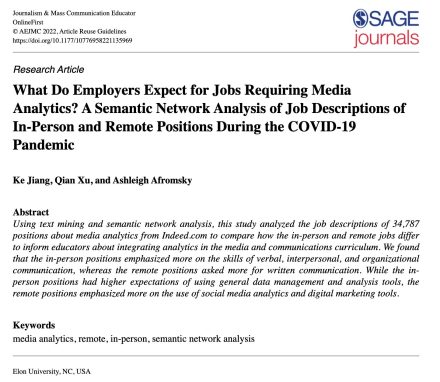Ashleigh Afromsky ’22 joined Assistant Professor Jenny Jiang and Professor Qian Xu to examine the job descriptions of nearly 35,000 positions related to media analytics following the COVID-19 pandemic. Their findings were recently published in the March edition of Journalism & Mass Communication Educator.
Ashleigh Afromsky ’22 recalls that she spent much of her free time junior year searching and applying to internships – a task familiar to many of her classmates.

As the media analytics and communication design double major contemplated the early direction of her career, School of Communications faculty members Jenny Jiang and Qian Xu approached Afromsky with a perfectly timed research project.
Together, the trio began exploring how the COVID-19 pandemic impacted the media analytics job market and the opportunities for higher education to prepare students entering a post-pandemic working world. More specifically, Jiang stated, the project’s objective was to identify collaborations between universities and industries, as well as examine the pandemic’s effects on media analytics curricula in U.S. institutions.
Their research topic has proven to be fruitful, yielding presentations at the National Conference on Undergraduate Research and SURF Day in 2021, and earning a top paper award at the 2022 national convention of the Association for Education in Journalism and Mass Communication (AEJMC). Most recently, the trio’s research was published in the March edition of Journalism & Mass Communication Educator, a peer-reviewed, quarterly journal.
Titled “What Do Employers Expect for Jobs Requiring Media Analytics? A Semantic Network Analysis of Job Descriptions of In-Person and Remote Positions During the COVID-19 Pandemic,” the article utilizes text mining to examine the job descriptions of 34,787 positions related to media analytics from Indeed.com.

“Our goal was to compare how the in-person and remote jobs differ to better inform educators on how to best integrate analytics in the media and communications into their curriculum,” Afromsky said. “We found that the in-person positions emphasized more on the skills of verbal, interpersonal, and organizational communication, whereas the remote positions asked more for written communication.”
To Afromsky’s surprise, their research indicated that the in-person positions had higher expectations of using general data management and analysis tools, while the remote positions emphasized more on the use of social media analytics and digital marketing tools.
“This research is relevant because it highlights the tangible skills that employers are looking for that professors can integrate into their curriculum to better prepare their students for post-graduate employment,” said Afromsky, noting how the sought-after skills in media analytics are everchanging.
Jiang commended Afromsky, calling it a “privilege” to collaborate with the student researcher “who possesses exceptional analytics skills.” The faculty member and student developed a strong rapport in fall 2020 during Jiang’s Applied Media Analytics class, where Afromsky demonstrated a strong passion for research. The two reunited last year to conduct an independent study course that led to this month’s article publication.
As part of her project, Afromsky utilized Parsehub, a web scraping tool, to compile the nearly 35,000 job postings. To help interpret the results of data analysis, the student met regularly with Jiang and Xu to brainstorm and contemplate the project’s direction.
“This publication is significant to me because it is my first publication with an undergraduate student as a co-author. This successful collaboration has motivated me to explore additional opportunities to involve undergraduate students in my digital media studies research projects.”
– Assistant Professor Jenny Jiang
Afromsky also praised Jiang and Xu, who serves as Elon’s associate director of undergraduate research, for their unending care and support. And noted that the benefits of their partnership far exceeded published bylines and additions to a resume.
“When professors Jiang and Xu brought me onto this project, I had no idea the impact it was going to have on my confidence,” she said. “Because of their encouragement, I was able to enhance my public speaking skills at prestigious conferences such as NCUR. I am so grateful for these two professors for believing in me, constantly giving me the opportunity to add my original input and thoughts, and being incredible mentors overall.”
Afromsky, now a junior associate at DNA Communications, is emphatic that students should consider conducting undergraduate research. She explained that her decision to do so has made a lasting impact, which she continues to feel today.
“For me, I was able to build meaningful relationships with professors that I still use as references and keep in touch with, even after graduating,” she said. “Also, as someone who is currently applying to graduate programs, having published research on my resume gave me a great talking-point during my grad school interviews.”
Afromsky added, “If I could give any advice to a current Elon student, it would be to approach your professors and ask if they could benefit from another set of hands on their research projects.”


